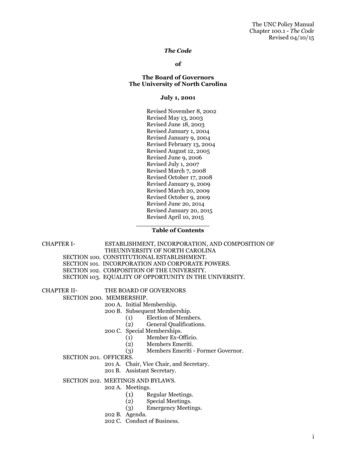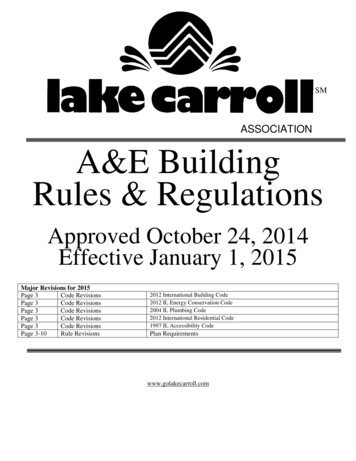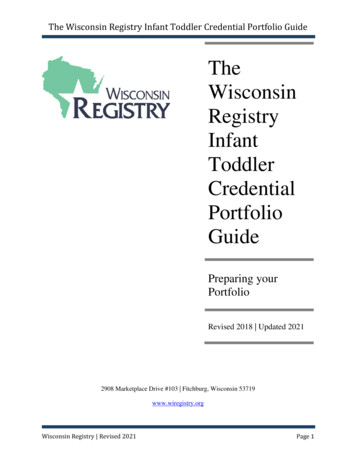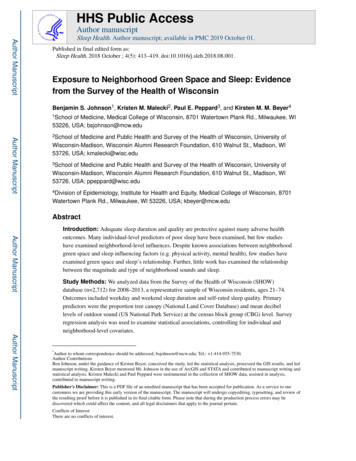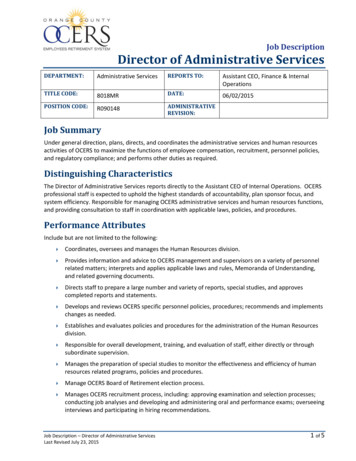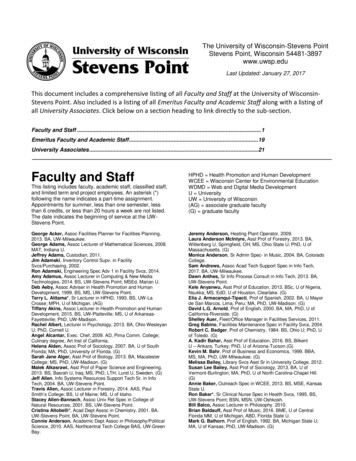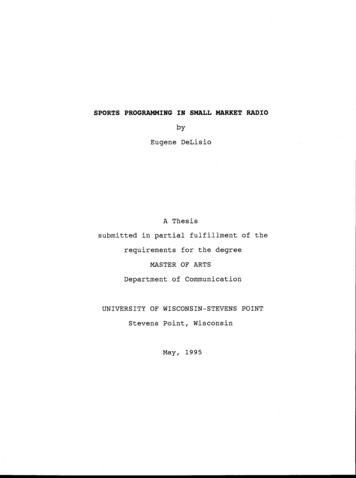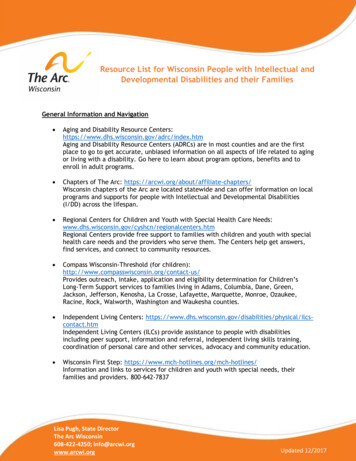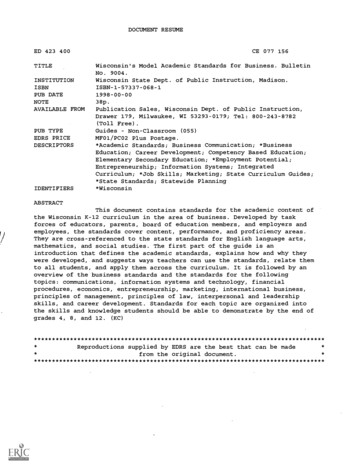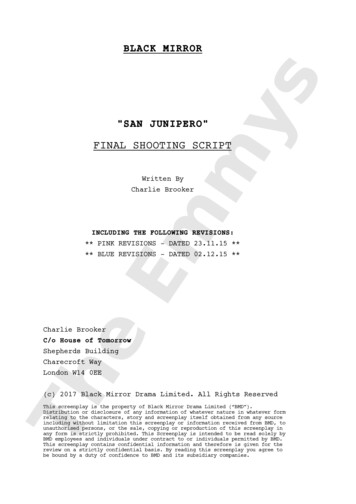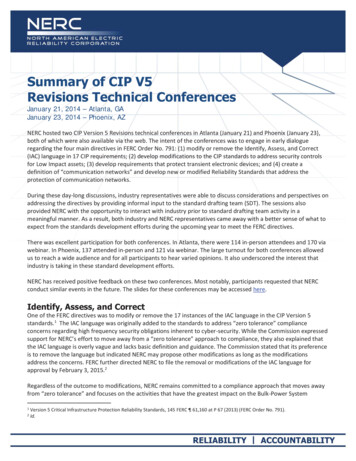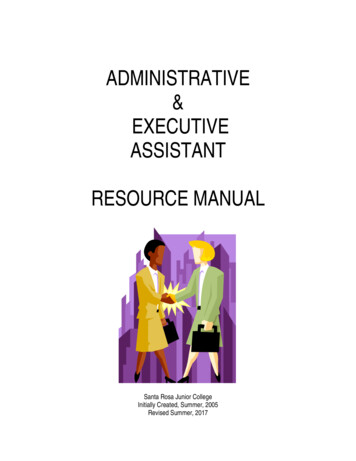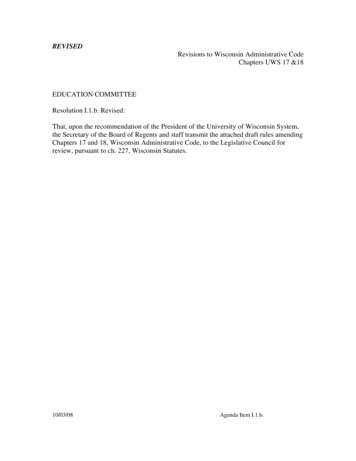
Transcription
REVISEDRevisions to Wisconsin Administrative CodeChapters UWS 17 &18EDUCATION COMMITTEEResolution I.1.b. Revised:That, upon the recommendation of the President of the University of Wisconsin System,the Secretary of the Board of Regents and staff transmit the attached draft rules amendingChapters 17 and 18, Wisconsin Administrative Code, to the Legislative Council forreview, pursuant to ch. 227, Wisconsin Statutes.10/03/08Agenda Item I.1.b.
October 3, 2008Agenda Item I.1.b.RECOMMENDED REVISIONS TOCHAPTERS UWS 17 AND 18, WIS. ADMIN. CODESEPTEMBER 2008EXECUTIVE SUMMARYBACKGROUNDThe Chapters UWS 17 and 18 Review Committee (Review Committee) was charged withreviewing and making recommendations to update and clarify Chapters UWS 17 and 18 of theWisconsin Administrative Code in preparation for rulemaking. The last major revision of thesechapters occurred in 1996.Chapter UWS 17, Wis. Admin. Code, “Student Nonacademic Disciplinary Procedures,” is basedon the premise that “the teaching, learning, research and service activities of the university canflourish only in an environment that is safe from violence and free of harassment, fraud, theft,disruption and intimidation.” 1 The chapter describes: (1) the types of student behaviors thatconstitute nonacademic misconduct; (2) students’ rights to due process and privacy; (3) thedisciplinary process; and (4) a range of consequences for nonacademic misconduct.Chapter UWS 18, Wis. Admin. Code, “Conduct on University Lands,” regulates the behavior ofboth students and nonstudents, including the public, who use university lands for work, study, orrecreation. University lands consist of the real property the UW System Board of Regents owns,leases, or controls. This chapter spans a wide range of conduct, such as motor vehicle operationand parking, ticket scalping, fraud in university accommodations or eating places, and sales ofgoods and services on campus. Most violations of Chapter UWS 18 are subject to fines of notmore than 500.REQUESTED ACTIONApproval of Resolution I.1.b., authorizing the Secretary of the Board of Regents and staff to takeappropriate steps to initiate, pursuant to ch. 227, Wisconsin Statutes, the administrativerulemaking process leading to promulgation of the attached draft rules amending Chapters UWS17 and 18, Wisconsin Administrative Code.DISCUSSIONThe Review Committee is comprised of student affairs officials from UW-Milwaukee,UW-Platteville, and UW-Whitewater; a police chief from UW-Madison; two students, fromUW-Milwaukee and UW-Whitewater; and staff from the UW System Offices of GeneralCounsel, Academic and Student Services, and Operations Review and Audit. As describedbelow, the Committee adopted core principles, conducted an extensive review process, andprepared recommended revisions to the two chapters.1Section UWS 17.01, Wis. Admin. Code (current).
Core PrinciplesCertain core principles guided the Review Committee’s work. In drafting revisions, theCommittee’s goal was to advance the mission of the UW System through administrative rulesthat: Promote safety and security;Respect the rights and responsibilities of all persons in the university community;Provide notice of behavioral expectations;Maintain an educational emphasis;Describe clear and understandable procedures; andRespect the unique characteristics of each campus community and mission.The Review Committee was sensitive to the need to strike a balance between providing clearguidance to students and staff, many of whom are unfamiliar with the rules, and allowing room foradministrators to exercise their sound judgment when addressing real-life situations in their owncampus communities.Review ProcessIn analyzing the existing rules, the Committee considered the diverse viewpoints and interests ofstudents, staff, and the public through a process designed to incorporate a broad range of views. Togather input from an array of perspectives, committee members: Held well-attended public listening sessions in the spring of 2007, at UW-Stevens Point andUW-Milwaukee. Developed and publicized a website through which interested persons submitted comments onthe existing rules in April and May 2007. Publicized the website a second time, inviting and receiving comments on the Committee’s draftrevisions, in February and March 2008. Considered each of the hundreds of suggestions offered by students, university neighbors andother members of the university community, local officials, and members of the public whosubmitted input during the two comment periods. Researched and reviewed the disciplinary code language and best practices of other publicuniversities and model language written by student disciplinary code experts. Conducted legal research, reviewed Association for Student Judicial Affairs 2 materials, andanalyzed current literature on student developmental theory and discipline.2The Association for Student Judicial Affairs is a professional organization for the integration of student developmentconcepts with principles of post-secondary judicial practice. A member of the Review Committee is the immediate pastpresident of the Association.2
Met with additional constituent groups, including student government leaders, chief studentaffairs officers, and university judicial officers. Considered the recommendations of the President’s Commission on University Security, as theypertain to Chapters UWS 17 and 18, and reviewed the reports of the Governor's Task Force onCampus Safety, which focused on safety issues at college campuses across Wisconsin. Reviewed and built upon the recommendations of two earlier committees, a Chapter UWS 17 adhoc advisory group and a Chapter UWS 18 review committee, consisting of UW student affairsofficials, UW police chiefs, and staff from the UW System Offices of General Counsel,Academic and Student Services, and Operations Review and Audit.Before any revisions may be adopted, they must be submitted for legislative review. Theadministrative rulemaking process includes a review by the Legislative Council, a public hearing bymembers of the Board of Regents, final approval by the Board of Regents, and submittal to theLegislature. The target date for implementation of the revised rules is fall 2009.Chapter UWS 17 RecommendationsThe recommended revisions to Chapter UWS 17 seek to clarify various aspects of the university’sdisciplinary process. The disciplinary process and significant revisions are outlined below.Disciplinary ProcessIn general, the nonacademic misconduct disciplinary process involves: (1) a complaint about astudent’s conduct; (2) a discussion between the investigating officer and student; (3) a decision bythe investigating officer about whether to initiate disciplinary procedures against a student foralleged misconduct; (4) an investigation, typically by the Dean of Students’ office; (5) a decision tofind a student either responsible or not responsible for nonacademic misconduct; and (6) arecommended sanction, if a student is found responsible for nonacademic misconduct. In someinstances, the process may also involve a settlement agreement. A range of possible sanctions aredetailed within Chapter UWS 17.In a subset of disciplinary actions, a hearing is either requested by a student or is required. Thishearing is conducted by a hearing examiner (a faculty or staff member appointed by the chancellor)or a hearing committee comprised of at least three members of the university community, includingstudent, faculty, and staff members. The hearing examiner or committee determines whethernonacademic misconduct occurred and whether to recommend one or more sanctions.If it is determined that misconduct did occur, and if a student receives a more serious sanction(enrollment restrictions on a course or program, suspension, or expulsion), the student has the rightto appeal the determination to the chancellor. Ultimately, in such an instance, the student mayappeal to the Board of Regents. The Board may, at its discretion, review the record in the matter.Page 3 of 37
Recommended RevisionsSome recommended revisions to Chapter UWS17 are organizational, and others are substantive.Among the revisions are the following: Updates: The revisions take into account social changes or changes in the universityenvironment since the rules were last revised. For example, the current Chapter UWS 17 relieson personal delivery or U.S. mail to provide notifications to students. The revisions provide forelectronic delivery of notices, because UW institutions increasingly conduct most other businessthrough electronic mail. This is more convenient for students, it expedites the process, andstudents expect this type of service. Scope: The revisions make explicit that under Chapter UWS 17 a student may be subject to theuniversity disciplinary process for off-campus misconduct. Disciplinary action in response tooff-campus misconduct is covered under the existing Chapter UWS 17; the revisions state thisauthority explicitly and also add parameters for decision making. A student may be subject tothe university disciplinary process for off-campus misconduct only if a two-part test is met:(1) The off-campus conduct must meet the definition of misconduct, as defined by the news. UWS 17.09, which lists types of conduct subject to the disciplinary process.AND(2) The off-campus conduct must adversely affect a substantial university interest, as describedin s. UWS 17.08. In determining whether a substantial university interest has been affected,the investigating officer is to consider whether the conduct meets one or more of thefollowing conditions:(a) The conduct constitutes or would constitute a serious criminal offense, regardless of theexistence of any criminal proceedings.(b) The conduct indicates that the student presented or may present a danger or threat to thehealth or safety of himself, herself, or others.(c) The conduct demonstrates a pattern of behavior that seriously impairs the university’sability to fulfill its teaching, research, or public service missions.The recommended language does not require the university to take action in any given situation.The language does, however, provide administrative tools to address egregious or dangerousinstances of student misconduct.As with all allegations of misconduct, a student is afforded the opportunity to request a hearingand dispute any allegation. The student may be able to demonstrate, for example, that thealleged conduct did not occur or that the conduct did not affect a substantial university interest.Appeal rights are also provided, as described on page 3.Page 4 of 37
Some comments on the draft rules raised concerns that the off-campus misconduct provisions inChapter UWS 17 would result in “double punishment,” punishment by both the university andlocal authorities, for the same conduct. While the Review Committee appreciates theseconcerns, it recognizes that the civil and criminal justice systems operate independently of, andhave different goals from, the university. The university has a responsibility to ensure itsmissions can be performed safely and without disruption, and the university must retain theauthority to address conduct which affects the university. Individuals are operating within, andare part of, multiple systems, and may be subject to the rules and expectations of them all. Conduct expectations: The revised language provides notice to students of the types ofnonacademic misconduct subject to disciplinary action in a clearly categorized list, rather thanin paragraph style. This makes the chapter easier to read and is consistent with the format atother universities. The types of misconduct on the list are potentially subject to disciplinaryaction if they occur on campus, and they are potentially subject to disciplinary action if theyoccur off campus only if the off-campus conduct affects a substantial university interest. Sanctions: The revisions provide an option for educational and developmentally appropriatesanctions in response to nonacademic misconduct. Examples of educational or service sanctionsare community service, an educational course, or an alcohol or other drug abuse assessment.Current literature supports the importance of an educational emphasis in disciplinary actions sothat the situation results in real student growth and learning and a reduced chance for thebehavior to be repeated. Hearing process: Some of the recommended revisions to the hearing process entail proceduresthat are less legalistic and more consistent with an educational, rather than an adversarial,approach to discipline. For example, a student will be permitted to have an advisor attend thehearing with him or her, but the student will be expected to speak for himself or herself. Thispractice is similar to the practice at other universities, as well as to the practice for studentacademic misconduct hearings under Chapter UWS 14. Recent work and study in the area ofstudent conduct rules support changes to make hearings more clearly educational in style andformat and less like a court proceeding. “The more legalistic our processes, the lessdevelopmental and educational they will be,” according to Brett Sokolow, president of theNational Center for Higher Education Risk Management. 3Other important clarifications in the hearing process are intended to improve efficiency andeffectiveness, while preserving and protecting students’ due process rights. Among therefinements are changes that: (1) expedite the timing and scheduling of disciplinary processesby allowing for electronic communication; (2) provide a student the option to choose between ahearing examiner and hearing committee when the anticipated sanction is enrollment restrictionson a course or program, suspension, or expulsion; and (3) provide a timeframe within which astudent may appeal the most serious sanctions to the chancellor or the Board of Regents.3Brett A. Sokolow, “Crafting a Code of Conduct for the 21st Century College,” The National Center for HigherEducation Risk Management (2004), p. 4.Page 5 of 37
Emergency suspension process: Streamlining the emergency suspension process allows for atimely response in removing a student from campus when the safety of an individual student orthe campus community may be at stake. The revisions retain the current conditions for decidingwhether an emergency suspension is appropriate and preserve a student’s right to a hearing,while also allowing a chancellor to render a decision without undue delay.The recommended revisions to Chapter UWS 17 are described in detail in Attachment 1.Chapter UWS 18 RecommendationsPolice and security departments at the UW institutions enforce compliance with Chapter UWS 18through their citation authority. For students, compliance also may be enforced through thedisciplinary procedures of Chapter UWS 17, since violations of Chapter UWS 18 are includedamong the misconduct provisions in Chapter UWS 17.The proposed revisions to Chapter UWS 18 are intended to ensure UW police officers have thetools they need to preserve the safety and security of the campus community, particularly in light ofthe recent focus on campus security efforts. Chapter UWS 18, like Chapter UWS 17, does notrequire university action in a given situation; rather, the provisions of Chapter UWS 18 allowofficers to apply their judgment and experience in determining when an individual’s conductwarrants a citation. The Review Committee recommends revisions in the following general areas: Organization: Section 18.06, Wis. Admin. Code, within Chapter UWS 18, is a list of more than50 types of prohibited conduct. The proposed restructuring of s. 18.06 into seven categoriesmakes the chapter more “user friendly” by grouping types of conduct into logical categories. Updates: The recommendations provide two primary types of technical updates: (1) somesections in Chapter UWS 18 mirrored other provisions in state law, and the Review Committeeidentified revisions that reflect changes elsewhere in the statutes or Code, such as an increase inthe dollar value of property in Chapter UWS 18’s theft provision; and (2) technologicaladvances, such as newer types of motorized vehicles, keyless entry systems, and theft detectiondevices have become relevant in recent years, and these are added. Evolving types of conduct: University police and security officers have encountered behaviorsthat are not specifically covered in Chapter UWS 18. Examples are disruptions by unauthorizedpersons on campus or bicycle stunt riding. The revisions address such behaviors.The recommended revisions to Chapter UWS 18 are described in detail in Attachments 2 and 3.CONCLUSIONRevised and updated administrative rules will be easier to use and understand for students,university officials, and the public. The recommended revisions to Chapter UWS 17 focus on: 1)maintaining a safe and secure campus environment; 2) ensuring procedural fairness for students;and 3) addressing student nonacademic misconduct through an educational disciplinary process.Page 6 of 37
The recommended revisions to Chapter UWS 18 are also based on maintaining a safe and securecampus environment; they provide organizational, technical, and practical improvements.With the Board’s approval, the recommendations will be forwarded to the Wisconsin LegislativeCouncil, as the next step in the rulemaking process. After any necessary revisions, the Board ofRegents will hold a public hearing on the draft rules, consider further revisions, and submit the rulesto the Legislature for review.RECOMMENDATIONThe University of Wisconsin System recommends approval of Resolution I.1.b., authorizing theSecretary of the Board of Regents and staff to take appropriate steps to initiate, pursuant to ch. 227,Wisconsin Statutes, the administrative rulemaking process leading to promulgation of the attacheddraft rules amending Chapters UWS 17 and 18, Wisconsin Administrative Code.RELATED REGENT POLICIESBylaws of the Board of Regents of the University of Wisconsin System, Chapter III, Section 7,“Duties of the Committee on Student Discipline and Other Student Appeals.”Page 7 of 37
ATTACHMENT 1Recommended Revisions of Chapter UWS 17, Wis. Admin. CodePROPOSED REVISION17.01 Policy statement. The missions of the university of Wisconsin systemand its individual institutions can be realized only if the university’s teaching,learning, research and service activities occur in living and learningenvironments that are safe and free from violence, harassment, fraud, theft,disruption and intimidation. In promoting such environments, the universityhas a responsibility to address student nonacademic misconduct; thisresponsibility is separate from and independent of any civil or criminal actionresulting from a student’s conduct. This chapter defines nonacademicmisconduct, provides university procedures for effectively addressingmisconduct, offers educational responses to misconduct, and recognizesstudents’ constitutional and procedural rights.17.02 Definitions. In this chapter:17.02(1) “Chief administrative officer” means the chancellor of an institution ordean of a campus or their designees.17.02(2) “Clear and convincing evidence” means information that wouldpersuade a reasonable person to have a firm belief that a proposition is morelikely true than not true. It is a higher standard of proof than “preponderanceof the evidence.”17.02(3) "Days" means calendar days.17.02(4) “Delivered” means any of the following: (a) given personally; (b)placed in the student’s official university mailbox; (c) mailed by regular firstclass United States mail to the student’s current address as maintained by theinstitution; or (d) sent by electronic means to the student’s official Universityemail address.17.02(5) "Disciplinary file" means the record maintained by the student affairsofficer responsible for student discipline.EXPLANATIONThe revision:1) acknowledges thevarious missions of theindividual UW institutions; 2)avoids geographicallimitations, because UWstudents participating inUW-sponsored studyabroad programs are alsoentitled to safe living andlearning environments; 3)recognizes that studentsmay be held accountable forcivil and criminal offenses;and 4) removes referencesto “faculty or staff whoviolate universitystandards,” becauseChapter UWS 17 appliesonly to students.Adds “chief administrativeofficer” to be consistent withChapter UWS 18. (Thislanguage has beensubstituted for “chancellor”throughout Chapter UWS17.)Adds definition of “clear andconvincing,” which is addedto the section on hearingprocedures.Adds definition of“delivered” to specify meansof communicating tostudents official actionstaken by the administrationin connection with thischapter.17.02(6) "Disciplinary probation" means a status in which a student mayremain enrolled in the university only upon the condition that the studentcomplies with specified standards of conduct or other requirements orrestrictions on privileges, for a specified period of time, not to exceed twoyears.17.02(7) "Disciplinary sanction" means any action listed in s. UWS 17.10(1)taken in response to student nonacademic misconduct.Page 8 of 37
PROPOSED REVISION17.02(8) "Expulsion" means termination of student status with resultant loss ofall student rights and privileges.17.02(9) “Hearing examiner" means an individual, other than the investigatingofficer, appointed by the chief administrative officer in accordance with s.UWS 17.06(2) for the purpose of conducting a hearing under s. UWS 17.12.17.02(10) “Institution” means any university, or an organizational equivalentdesignated by the board, and the university of Wisconsin colleges.17.02(11) "Investigating officer" means an individual, or his or her designee,appointed by the chief administrative officer of each institution, to conductinvestigations of nonacademic misconduct under this chapter.EXPLANATIONRemoves definition of“harassment” because it isaddressed in new s. UWS17.09.Clarifies the meaning of“institution” to include UWColleges and UWExtension.17.02(12) "Nonacademic misconduct hearing committee" or "committee"means the committee appointed pursuant to s. UWS 17.06 to conducthearings under s. UWS 17.12.17.02(13) “Preponderance of the evidence” means information that wouldpersuade a reasonable person that a proposition is more probably true thannot true. It is a lower standard of proof than “clear and convincing evidence”and is the minimum standard for a finding of responsibility under this chapter.17.02(14) "Student" means any person who is registered for study in aninstitution for the academic period in which the misconduct occurred, orbetween academic periods, for continuing students.17.02(15) "Student affairs officer" means the dean of students or studentaffairs officer designated by the chief administrative officer to coordinatedisciplinary hearings and carry out duties described in this chapter.Adds definition of“preponderance of theevidence,” which is addedto the section on hearingprocedures.Removes definition of“stalking” because stalkingis addressed in the new s.UWS 17.09.17.02(16) "Suspension" means a loss of student status for a specified lengthof time, not to exceed two years, with resultant loss of all student rights andprivileges.Adds consistency byreferring to time periodsthroughout the chapter interms of years rather thanmonths.17.02(17) “University lands” means all real property owned by, leased by, orotherwise subject to the control of the board of regents of the university ofWisconsin system.Adds definition of Universitylands as it is defined inChapter UWS 18.17.03 Consistent institutional policies. Each institution is authorized toadopt policies consistent with this chapter. A copy of such policies shall befiled with the board of regents and the university of Wisconsin system office ofacademic affairs.Relocates and renumbersexisting s. UWS 17.16.17.04 Notice to students. Each institution shall publish ch. UWS 17 on itswebsite and shall make ch. UWS 17 and any institutional policiesimplementing ch. UWS 17 freely available to students through the website orother means.Relocates and renumbersexisting s. UWS 17.15.Clarifies language.17.05 Designation of investigating officer. The chief administrative officerof each institution shall designate an investigating officer or officers forallegations of student nonacademic misconduct. The investigating officer shallRelocates and renumbersexisting s. UWS 17.13.Page 9 of 37
PROPOSED REVISIONhave responsibility for investigating student nonacademic misconduct andinitiating procedures for nonacademic misconduct under s. UWS 17.11.17.06 Non-academic misconduct hearing examiner.17.06(1) The chief administrative officer of each institution, in consultationwith faculty, academic staff, and student representatives, shall adopt policiesproviding for the designation of a student nonacademic misconduct hearingexaminer to fulfill the responsibilities of the nonacademic misconduct hearingexaminer in this chapter.EXPLANATIONRelocates and renumbersexisting s. UWS 17.14.Separates into two sectionsthe appointment processesfor a hearing examiner anda hearing committee.17.06(2) A hearing examiner shall be selected by the chief administrativeofficer from the faculty and staff of the institution.17.07 Non-academic misconduct hearing committee.17.07(1) The chief administrative officer of each institution, in consultationwith faculty, academic staff, and student representatives, shall adopt policiesproviding for the establishment of a student nonacademic misconduct hearingcommittee to fulfill the responsibilities of the nonacademic misconduct hearingcommittee in this chapter.Relocates and renumbersexisting s. UWS 17.14.Separates into two sectionsthe appointment processesfor a hearing examiner anda hearing committee.17.07(2) A student nonacademic misconduct hearing committee shall consistof at least three persons, including a student or students, except that no suchcommittee shall be constituted with a majority of members who are students.The presiding officer shall be appointed by the chief administrative officer.The presiding officer and at least one other member shall constitute a quorumat any hearing held pursuant to due notice.17.08 Nonacademic misconduct occurring on or outside of universitylands.17.08(1) MISCONDUCT ON UNIVERSITY LANDS. With the exception of theconduct described in 17.08(2), the provisions contained in this chapter shallapply to the student conduct described in s. 17.09 that occurs on universitylands or at university-sponsored events.17.08(2) MISCONDUCT OUTSIDE OF UNIVERSITY LANDS. The provisionscontained in this chapter may apply to the student conduct described in s.17.09 that occurs outside of university lands only when, in the judgment of theinvestigating officer, the conduct adversely affects a substantial universityinterest. In determining whether the conduct adversely affects a substantialuniversity interest, the investigating officer shall consider whether the conductmeets one or more of the following conditions:(a) The conduct constitutes or would constitute a serious criminal offense,regardless of the existence of any criminal proceedings.(b) The conduct indicates that the student presented or may present adanger or threat to the health or safety of himself, herself or others.(c) The conduct demonstrates a pattern of behavior that seriously impairs theuniversity’s ability to fulfill its teaching, research, or public service missions.17.09 Conduct subject to disciplinary action. The university may disciplinea student in nonacademic matters for engaging in, attempting to engage in, orassisting others to engage in the following:17.09(1) DANGEROUS CONDUCT. Conduct that endangers or threatensAdds language to makeexplicit the university’sjurisdictional authority underChapter UWS 17. Imposesthe limitation that ChapterUWS 17 may apply to offcampus misconduct only ifthe conduct affects asubstantial universityinterest.Reorganizes and clarifiesthe description of conductsubject to disciplinary actionto identify the kinds ofbehaviors of concern to thePage 10 of 37
PROPOSED REVISIONthe health or safety of oneself or another person.17.09(2) SEXUAL ASSAULT. Conduct defined in s. 940.225, Wis. Stats.EXPLANATIONUniversity. Adopts an easyto-read-list format, similar tothose in other universities’codes of conduct.17.09(3) STALKING. Conduct defined in s. 940.32, Wis. Stats.17.09(4) HARASSMENT. Conduct defined in s. 947.013, Wis. Stats.17.09(5) HAZING. Conduct defined in s. 948.51, Wis. Stats.Adds an explicit referenceto prohibitions against illegaluse of alcohol andcontrolled substances andto several other prohibitions.17.09(6) ILLEGAL USE, POSSESSION, MANUFACTURE, ORDISTRIBUTION OF ALCOHOL OR CONTROLLED SUBSTANCES. Use,possession, manufacture, or distribution of alcoholic beverages or ofmarijuana, narcotics, or other controlled substances, except as expresslypermitted by law or university policy.17.09(7) UNAUTHORIZED USE OF OR DAMAGE TO PROPERTY.Unauthorized possession of, use of, moving of, tampering with, damage to, ordestruction of university property or the property of others.17.09(8) DISRUPTION OF UNIVERSITY-AUTHORIZED ACTIVITIES.Conduct that obstructs or impairs university-run or university-authorizedactivities, or that interferes with or impedes the ability of a person toparticipate in university-run or university-authorized activities.17.09(9) FORGERY OR FALSIFICATION. Unauthorized possession of orfraudulent creation, alteration, or misuse of any university or othergovernmental document, record, key, electronic device, or identification.17.09(10) MISUSE OF COMPUTING RESOURCES. Conduct that involves:(a) failure to comply with laws, license agreements, and contracts governingcomputer network, software, and hardware use;(b) use of computing resources for unauthorized commercial purposes orpersonal gain;(c) failure to
UW-Platteville, and UW-Whitewater; a police chief from UW-Madison; two students, from UW-Milwaukee and UW-Whitewater; and staff from the UW System Offices of General Counsel, Academic and Student Services, and Operations Review and Audit. . it recognizes that the civil and criminal justice systems operate independently of, and have different .
